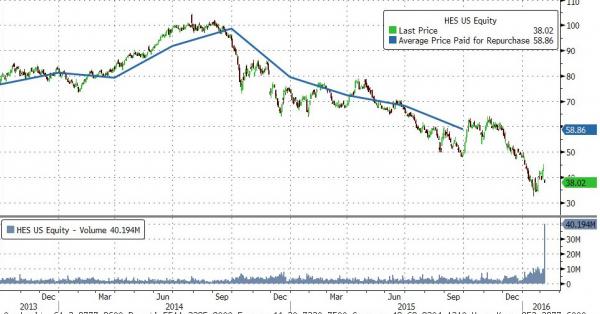Having long mocked the sheer idiocy of using organic cash or worse, debt proceeds, to fund buybacks just so management can eke out a few more million in equity-linked compensation while activists enjoy a few extra points in P&L on the back of naive bondholders managing ‘other people’s money’, we were delighted to see the buyback bubble begin to burst in the middle of 2015 starting with Michael Kors (as detailed in “When Stock Buybacks Go Horribly Wrong”) and Monsanto (“When Buybacks Fail…”), when each respective stock plunged far below the average buyback price.
But nothing compares to what Hess (HES) did yesterday.
A quick recap: back in 2013, when it was trading at a discount to its peers, Hess became the target of an activist campaign led by Paul Singer’s Elliott Management who demanded a quick boost in the stock price, as a result of which the energy producer decided to exit its refining business (arguably the only line of business that would have benefited from the current depressed oil price) while not only raising its dividend but also authorizing a $4 billion share buyback.
The company then boosted its buyback further with proceeds from the sale of its retail gas stations (for $2.9 billion) while growing its debt by $1 billion from 2013 to 2015, leading to the repurchase of a total of 62.7 million shares through the end of 2014 at an average price of $83.
The stock price reacted as expected: it soared past $100 from below $60 before Elliott turned up. It then continued to spend more billions under additional buyback all the way through the third quarter of 2015, which however took place just as the worst oil downturn in history was taking place. The full history of Hess’ stock buybacks is shown below.

And then the stock crashed, as investors finally realized that plunging oil, sliding cash flow and surging debt meant the company found itself in a life and death fight for survival.














Leave A Comment